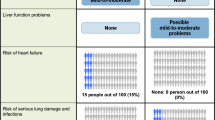Abstract
Purpose
This study aimed to examine how biomarker information would impact patients’ preferences and physicians’ recommendations for adjuvant breast cancer therapy.
Methods
At the 18-month follow-up, participants in a large, double-blind randomized controlled trial of adjuvant chemotherapy with bevacizumab or placebo (E5103) were surveyed about their preferred treatment (either chemotherapy A alone or chemotherapy A+B) in two hypothetical scenarios: (1) without biomarker information; and (2) after learning that they tested positive for a “B-receptor” which modestly increased both the benefit and toxicity expected with chemotherapy A+B. We performed a cross-sectional analysis of the prospectively collected survey data and used the McNemar’s test to examine changes in treatment preferences. A one-time survey of clinical investigators who enrolled patients on the trial evaluated physician recommendations in response to the same biomarker information.
Results
439 patients completed both scenarios on 18-month survey. Most participants preferred A+B in both scenario 1 and 2 (77 and 76% respectively). The increase in benefit and toxicity associated with the positive biomarker information in scenario 2 led 60/439 (14%) of patients to switch their treatment preference. The corresponding physician survey revealed that most physicians chose regimen A+B in scenario 1 (77%), and moreso after the biomarker information was available in scenario 2 (84%).
Conclusions
Information about a positive biomarker indicating increased benefit and toxicity from additional chemotherapy did not change many participants’ preferred treatment. The majority preferred the most effective course in both scenarios. Similarly, most investigators discounted increased toxicity and valued increased benefit. Parent Trial Registration: NCT00433511


Similar content being viewed by others
References
Schneider BP, Wang M, Radovich M, Sledge GW, Badve S, Thor A, Flockhart DA, Hancock B, Davidson N, Gralow J, Dickler M, Perez EA, Cobleigh M, Shenkier T, Edgerton S, Miller KD (2008) Association of vascular endothelial growth factor and vascular endothelial growth factor receptor-2 genetic polymorphisms with outcome in a trial of paclitaxel compared with paclitaxel plus bevacizumab in advanced breast cancer: ECOG 2100. J Clin Oncol 26:4672–4678. doi:10.1200/JCO.2008.16.1612
Schneider BP, Gray RJ, Radovich M, Shen F, Vance G, Li L, Jiang G, Miller KD, Gralow JR, Dickler MN, Cobleigh MA, Perez EA, Shenkier TN, Vang Nielsen K, Muller S, Thor A, Sledge GW Jr, Sparano JA, Davidson NE, Badve SS (2013) Prognostic and predictive value of tumor vascular endothelial growth factor gene amplification in metastatic breast cancer treated with paclitaxel with and without bevacizumab; results from ECOG 2100 trial. Clin Cancer Res 19:1281–1289. doi:10.1158/1078-0432.CCR-12-3029
Collins FS, Varmus H (2015) A new initiative on precision medicine. N Engl J Med 372:793–795. doi:10.1056/NEJMp1500523
Harris LN, Ismaila N, McShane LM, Andre F, Collyar DE, Gonzalez-Angulo AM, Hammond EH, Kuderer NM, Liu MC, Mennel RG, Van Poznak C, Bast RC, Hayes DF (2016) Use of biomarkers to guide decisions on adjuvant systemic therapy for women with early-stage invasive breast cancer: American Society of Clinical Oncology Clinical Practice Guideline. J Clin Oncol 34:1134–1150. doi:10.1200/JCO.2015.65.2289
Duffy MJ, Sturgeon CM, Soletormos G, Barak V, Molina R, Hayes DF, Diamandis EP, Bossuyt PM (2015) Validation of new cancer biomarkers: a position statement from the European group on tumor markers. Clin Chem 61:809–820. doi:10.1373/clinchem.2015.239863
Precision Medicine Initiative Cohort Program. http://www.nih.gov/precisionmedicine/. Accessed June 14 2015
Nalejska E, Maczynska E, Lewandowska MA (2014) Prognostic and predictive biomarkers: tools in personalized oncology. Mol Diagn Ther 18:273–284. doi:10.1007/s40291-013-0077-9
Yusuf RA, Rogith D, Hovick SR, Peterson SK, Burton-Chase AM, Fellman BM, Li Y, McKinney C, Bernstam EV, Meric-Bernstam F (2015) Attitudes toward molecular testing for personalized cancer therapy. Cancer 121:243–250. doi:10.1002/cncr.28966
Ngoi N, Lee SC, Hartman M, Khin LW, Wong A (2013) Interest and attitudes of patients, cancer physicians, medical students and cancer researchers towards a spectrum of genetic tests relevant to breast cancer patients. Breast 22:47–52. doi:10.1016/j.breast.2012.04.003
Leggett LE, Lorenzetti DL, Noseworthy T, Tiwana S, Mackean G, Clement F (2014) Experiences and attitudes toward risk of recurrence testing in women with breast cancer: a systematic review. Breast Cancer Res Treat 144:457–465. doi:10.1007/s10549-014-2900-3
Brewer NT, Edwards AS, O’Neill SC, Tzeng JP, Carey LA, Rimer BK (2009) When genomic and standard test results diverge: implications for breast cancer patients’ preference for chemotherapy. Breast Cancer Res Treat 117:25–29. doi:10.1007/s10549-008-0175-2
Lo SS, Mumby PB, Norton J, Rychlik K, Smerage J, Kash J, Chew HK, Gaynor ER, Hayes DF, Epstein A, Albain KS (2010) Prospective multicenter study of the impact of the 21-gene recurrence score assay on medical oncologist and patient adjuvant breast cancer treatment selection. J Clin Oncol 28:1671–1676. doi:10.1200/JCO.2008.20.2119
Britton A, McKee M, Black N, McPherson K, Sanderson C, Bain C (1999) Threats to applicability of randomised trials: exclusions and selective participation. J Health Serv Res Policy 4:112–121
Funding
This study was coordinated by the ECOG-ACRIN Cancer Research Group (Robert L. Comis, MD and Mitchell D. Schnall, MD, PhD, Group Co-Chairs) and supported by the National Cancer Institute of the National Institutes of Health under the following award numbers: CA180820, CA21115, CA180794, CA23318, CA66636, CA025224, CA031946, CA077651, CA180821, CA180790, CA13650, CA180791, CA180795, CA49883, CA180816, CA180867. The content is solely the responsibility of the authors and does not necessarily represent the official views of the National Institutes of Health, nor does mention of trade names, commercial products, or organizations imply endorsement by the U.S. government. Also supported by a Susan G. Komen for the Cure, Promise Award (Bryan P. Schneider).
Author information
Authors and Affiliations
Corresponding author
Ethics declarations
Conflict of interest
Ann Partridge declares that she has no conflict of interest. Karen Sepucha declares that she has no conflict of interest. Anne O’Neill declares that she has no conflict of interest. Kathy D. Miller declares that she has no conflict of interest. Emily Baker declares that she has no conflict of interest. Chau T. Dang reports funding from Roche/Genentech. Donald W. Northfelt declares that he has no conflict of interest. George W. Sledge declares that he has no conflict of interest. Bryan P. Schneider declares that he has no conflict of interest.
Ethical approval
All procedures performed in studies involving human participants were in accordance with the ethical standards of the institutional and/or national research committee and with the 1964 Helsinki declaration and its later amendments or comparable ethical standards.
Informed consent
Informed consent was obtained from all individual participants included in the study.
Rights and permissions
About this article
Cite this article
Partridge, A.H., Sepucha, K., O’Neill, A. et al. Does biomarker information impact breast cancer patients’ preferences and physician recommendation for adjuvant chemotherapy?. Breast Cancer Res Treat 165, 545–553 (2017). https://doi.org/10.1007/s10549-017-4338-x
Received:
Accepted:
Published:
Issue Date:
DOI: https://doi.org/10.1007/s10549-017-4338-x




